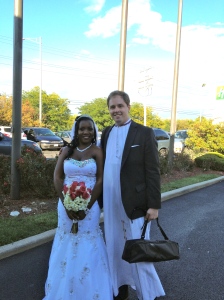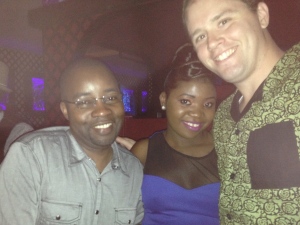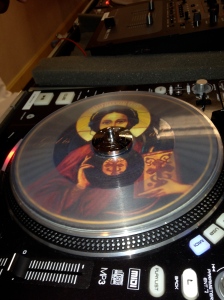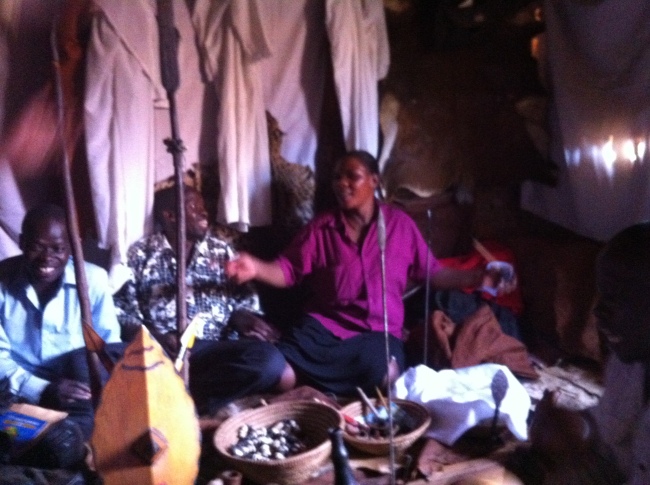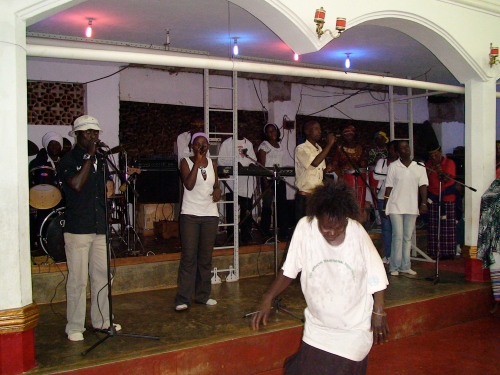One of the common turns of phrase that seems to come up again and again in Luganda–or in Luganda-speakers’ English–is to ask not only about one’s family, but about one’s place. How is Ntinda? How is America? How is South Carolina? And my personal favorite, how are those ends? (Alternatively, when will you come back to this side/these ends?) Well, until September 2011, I had never considered that any of “these ends” could so closely resemble “those ends,” either socio-linguistically or culturally. Then I attended a kwanjula in Boston.
Well, the same bride who introduced her groom to her adoring family that weekend made him a very happy man this past weekend in Chicago. They have since relocated, and their wedding was no less a thoroughly Ugandan affair than was their introduction ceremony. The Boston contingent made the trek in large vans, by plane, and however else they could. I met others who traveled from Minnesota, Michigan, New York, and Ohio. But most–safely over 95%–were first or second generation Ugandan immigrants from Buganda. These are doctors and lawyers, nurses and fashion designers, students and teachers; they are a well-educated, high-achieving bunch, to be sure. It is easy to see how so many of the present generation of Africans in the Diaspora hold so much hope and promise for the future. As I look toward a new phase of research revolving around these Ugandan communities in the U.S., it is very exciting to see the great variety of things its members are doing in the world.
I had not intended my presence at this event to meet with the same conspicuous attention as my performance of the Ffumbe clan slogan at the kwanjula did in 2011. I had simply stayed in touch with the bride and groom, and I wanted to celebrate with them on their big day. As aunties have a tendency to do, however, the bassenga from Boston informed me that I would be reciting the bride’s paternal and maternal genealogies at the reception. As this had been become a major opportunity for networking and thinking about new research directions the last time I did it, I of course readily agreed. In any case, how could I say no to this bride, much less her aunties?
When I initially started writing about the 2011 event, the connections between kinship, music and tradition fascinated me. Between then and now, however, I had the opportunity to travel back to Boston and experience some of the rest of the music scene in one of the largest Ugandan communities in the U.S. Traveling to Chicago then came with the promise of new possibilities for discovering how things might be different there…and how different they were.
The nightclub that played almost exclusively Ugandan pop in Waltham, Massachusetts was interesting, and it’s a place I hope to return. But the aptly named Club Enigma in Chicago provided a fascinating contrast. Far from the local pub experience that tends to attract Waltham’s slightly older crowd, Enigma was like walking into a Kampala nightclub. The ten-dollar cover charge, the security at the door, the lighting, the overpriced drinks, and especially the DJ’s mix of contemporary Ugandan and American pop made it seem like the whole place had been transplanted directly out of suburban Uganda’s upwardly mobile communities.
I might have come to expect this from a younger crowd closer to the Chicago city limits than Waltham is to Boston, even if both places are fairly typical of immigrant communities in American suburbia. What I didn’t expect was the utter disorienting experience that this club offered two completely different cultural experiences in the same building. At the bottom of the main staircase, a right turn means Ugandan Urban Underground, but a left turn translates to Bulgarian Boom Boom Room. The latter was nearly three times as large, and attracted a crowd befitting the space. Managing sound bleed seemed only a matter of cranking the volume in each space loud enough to mask anything coming from the other. For the most part, people came with a culturally specific experience in mind, but they frequently walked over to “the other side” to check out what was going on, do some people watching, hear the music, scope out a fleeting physical interest, or even dance to a bit different beat. Let me just say that the kasiki (a Ugandan version of a bachelor party) and the wedding after-party the next night did not offer nearly enough time to try to parse this one out. Enigma indeed.
Two things remained consistent between Waltham and Arlington Heights/Chicago: these events are still all about networks of kin, and both communities still revolve around Roman Catholic church life.
Above: the groom, Godfrey, with the maid of honor, Vivian and yours truly
One of my favorite images came from the DJ booth:
I call it “Ain’t No Party Like a Messiah Party”
(glossy facsimile on turntable)

